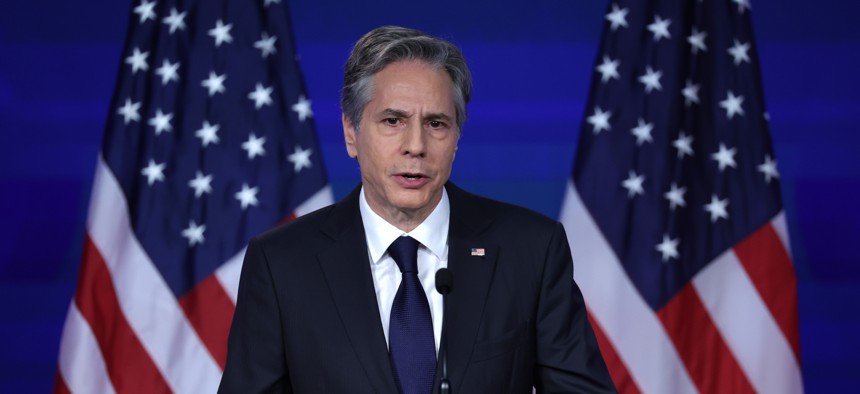Secretary of State Makes Case for Tech-Centered Strategy to Counter China

WASHINGTON, DC - MAY 26: U.S. Secretary of State Antony Blinken speaks on China at Jack Morton Auditorium of George Washington University May 26, 2022 in Washington, DC. Blinken delivered a speech on the Biden administration’s policy toward China during the event hosted by the Asia Society Policy Institute (Photo by Alex Wong/Getty Images)
The secretary delivered a speech outlining the administration’s policy toward Beijing as Congress tries to reconcile legislation that would provide at least $50 billion to increase domestic production of semiconductors.
Secretary of State Antony Blinken joined a chorus of current and former administration officials urging lawmakers to pass legislation that would significantly invest in research and development and private-sector incentives to secure the supply chain of advanced technologies from threats presented by China.
“The House and Senate have passed bills to support this agenda, including billions to produce semiconductors here and to strengthen other critical supply chains,” Blinken said. “Now, we need Congress to send the legislation to the president for his signature.”
Blinken was specifically referring to legislation that is being conferenced by members of the House and Senate which have each passed their own versions of legislation that would put at least $50 billion toward grants to incentivize the industry to establish fabrication plants for the chips—the vast majority of which are currently in East Asia—within the United States.
The Semiconductor Industry Association is pushing for additional tax breaks. Some Republican members of Congress have questioned allowing U.S. companies a tax write-off for investments in semiconductor R&D on top of the grant incentives.
Blinken delivered a speech describing the administration’s approach to China at George Washington University Thursday. The event, hosted by the Asia Society, was presented with the aim of maintaining peace with China as tensions mount with Beijing over, among other things, dynamics involving Taiwan, a leading manufacturer of the silicon chips used across modern electronics, including automobiles and fifth generation networking technology.
“We are not looking for conflict or a new cold war. To the contrary, we're determined to avoid both. We don't seek to block China from its role as a major power … from growing their economy, or advancing the interests of their people,” Blinken said. “But we will defend and strengthen the international law, agreements, principles and institutions that maintain peace and security, protect the rights of individuals and sovereign nations, and make it possible for all countries, including the United States and China, to coexist and cooperate.”
Blinken said the administration’s policy could be summed up with three words: invest, align, compete. The appeal to Congress hits the first part of that.
“Because our industrial strategy centers on technology, we want to invest in research, development, advanced manufacturing,” he said. “Sixty years ago, our government spent more than twice as much on research as a percentage of our economy as we do now … we used to rank first in the world in R&D as a proportion of our [Gross Domestic Product], now, we're ninth. Meanwhile, China has risen from eighth place to second. With bipartisan congressional support, we'll reverse these trends.”
In terms of alignment and competition, Blinken stressed the importance of working in concert with international allies and more actively defending against China’s efforts to advance its own technological might and influence, including by improving national cyber defenses.
“As we make sure the next wave of innovation is unleashed by the United States and our allies and partners, we will also protect ourselves against efforts to siphon off our ingenuity or imperil our security,” Blinken said. “We're sharpening our tools to safeguard our technological competitiveness. That includes new and stronger export controls to make sure our critical innovations don't end up in the wrong hands, greater protections for academic research … better cyber defenses, stronger security for sensitive data, and sharper investment screening measures to defend companies and countries against Beijing's efforts to gain access to sensitive technologies, data or critical infrastructure.”






